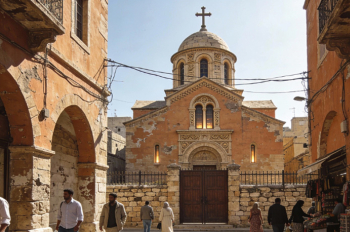
A Christian in Pakistan won a rare grant of bail on Monday (Sept. 8), a day after he was arrested and charged with blasphemy, sources said.
Maan Shaukat Masih, a 25-year-old resident of Nishat Colony in Lahore, was accused of tearing down a banner inscribed with the name of Islam’s sacred personages. He voluntarily surrendered to police on Sunday (Sept. 7) after Muslim neighbors accused him of tearing down the banner that was hoisted in a street on the occasion of Eid Milad-Un-Nabi, the birth anniversary of Islam’s prophet.
Masih, a tailor, was in the street with Christian friends when some Muslims joined them, said Sohail Habil of legal aid group HARDS Pakistan.
“Routine conversation gradually turned into a religious discussion, after which Maan and his Christian friends thought it was better to disengage and return to their homes,” Habil told Christian Daily International-Morning Star News. “Meanwhile, some Muslim boys spread the word that Masih had pulled down a banner containing the names of the Islamic holy persons, causing religious tension in the area.”
In an effort to resolve the matter, local Christian and Muslim leaders held a joint meeting, but the matter escalated due to provocation by Islamic extremist elements, Habil said.
“They demanded that Masih be arrested and charged with blasphemy, warning that the Christian residents would have to face the consequences if they did not surrender him,” he said.
Fearing for the safety of their son and other Christians, Masih’s family decided to voluntarily hand him over to the police before registration of a case, Habil added.
A few hours after Masih’s surrender, however, the South Cantt Police registered a case against him under Section 298 of the blasphemy statutes on the complaint of a Muslim, Shafique Ahmed, Habil said. Section 298 of the Pakistan Penal Code deals with offenses that are meant to hurt the religious feelings of any person by certain actions or expressions and is punishable by imprisonment of up to one year or fine, or both.
Masih appeared in the court of Lahore Cantt Judicial Magistrate Ghulam Shabbir on Monday (Sept. 8), when the investigation officer sought his judicial remand. The judge, however, admitted the arguments of the defense counsel and granted Masih’s release on bail against surety bonds amounting to 50,000 Pakistani Rupees ($177 USD), Habil said.
“This is a rare case in which a blasphemy accused has been freed on bail after spending only a few hours behind the bars,” he said . “This was made possible only by the grace of our Lord who answered the prayers of Masih’s family and other Christians of the neighborhood. The entire community was very tense because this accusation has come weeks after another resident of the area, Amir Peter, was arrested on charges that he had disrespected Islam’s prophet.”
Masih and his family have relocated to a safe place as a security precaution, he added.
Masih said he was shocked to learn about the accusation against him by his Muslim neighbors.
“I had no idea that our discussion, even though it wasn’t offensive, would result in my arrest on a charge as serious as blasphemy,” Masih told Christian Daily International-Morning Star News. “I had heard about the suffering of those accused of blasphemy, but experiencing it myself has left a deep impact on my life. When I was taken into custody I was very upset and uncertain about my future, but when the judge ordered my release on bail I cannot express the joy and happiness I felt at the moment. I cannot thank God enough for listening to my parents’ prayers and rescuing me.”
Blasphemy remains a capital offense in Pakistan, punishable by death. Although the state has not executed anyone under the law, mere accusations have triggered mob violence resulting in dozens of deaths over the past decade. The accused often endure long pretrial detentions, unfair trials and constant threat of extrajudicial killing.
Human Rights Watch in a June 9 report stated that Pakistan’s blasphemy laws were being systematically misused to target religious minorities, dispossess the poor and settle personal and economic disputes.
“Blasphemy accusations are increasingly weaponized to incite mob violence, displace vulnerable communities and seize their property with impunity,” states the 29-page report, “A Conspiracy to Grab the Land: Exploiting Pakistan’s Blasphemy Laws for Blackmail and Profit.”
In several cases, blasphemy accusations were used to target business rivals or coerce property transfers, according to the report. It added that the law’s broad and vague provisions allow it to be exploited with minimal or no evidence, creating a climate of fear among vulnerable groups.
HRW criticized Pakistan’s criminal justice system for enabling these abuses. Authorities rarely hold perpetrators of mob violence accountable, while police often fail to protect the accused or investigate allegations, it stated. In some instances, officers who intervene face threats themselves. Political and religious actors accused of inciting violence frequently escape arrest or are acquitted due to lack of political will or intimidation.
Pakistan ranked eighth on Open Doors’ 2025 World Watch List of the 50 countries where it is most difficult places to be a Christian.






